
When Susan Smith confessed to having drowned her two small children back in 1994, it was hard not to draw parallels between this murderous mom of today and that lethal lady of mythology known as Medea. Though their motives were different (Susan wanted to get rid of her kids, the better to fool around with a man who didn’t want a “ready-made” family; Medea killed hers to punish her husband for an adulterous affair), the results were tragically the same.
Perhaps inspired by this tale as old as Greek tragedy and as recent as today’s headlines, playwright Michael Elyanow has written an extraordinary (if a tad too intricate) new play, The Children, which Theatre @ Boston Court is now World Premiering under the inspired direction of Jessica Kubzanky.
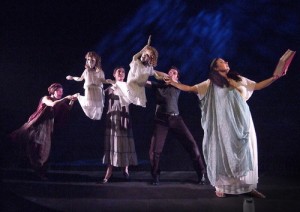 Here’s how Boston Court describes The Children on their website: “What if a character from Medea wrested the children away from their mother’s murderous intent, accidentally transporting them to present-day Maine in the middle of a hurricane? Is that the modern-day sheriff or Jason, Medea’s husband? Will these children grow up to overcome their horrific childhoods?”
Here’s how Boston Court describes The Children on their website: “What if a character from Medea wrested the children away from their mother’s murderous intent, accidentally transporting them to present-day Maine in the middle of a hurricane? Is that the modern-day sheriff or Jason, Medea’s husband? Will these children grow up to overcome their horrific childhoods?”
Though there are times when theaters give away too much when PR’ing a show (even a single word on the Road Theatre’s recent postcard for The Water’s Edge managed to be a case of TMI), Boston Court does its patrons a service by posing the above questions, each of which I highly recommend keeping in mind as The Children takes you on its fantastical yet somehow very real journey.
Elaynow’s dramedy starts off rather like an episode of The Twilight Zone, with two ancient Greeks, one the nursemaid to Medea’s two children, the other a member of the obligatory Greek Chorus, suddenly finding themselves in a rustic cottage somewhere in the vicinity of contemporary Athens. (That’s Athens, Maine, by the way.)
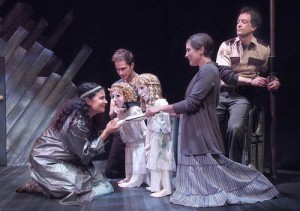 We soon learn that the Chorus member, aka The Woman Of Corinth, has kidnapped Medea’s two small children, the better to protect them from their mother’s deadly designs, in addition to having stolen Medea’s “cherished book of sorcery.” Though The Nursemaid tries to reassure The Woman that Medea’s threat to kill the children was an idle one, The Woman is having nothing of that.
We soon learn that the Chorus member, aka The Woman Of Corinth, has kidnapped Medea’s two small children, the better to protect them from their mother’s deadly designs, in addition to having stolen Medea’s “cherished book of sorcery.” Though The Nursemaid tries to reassure The Woman that Medea’s threat to kill the children was an idle one, The Woman is having nothing of that.
Meanwhile, from an oddly shaped and angled window in the cottage’s upstage wall, the kidnapped children observe and comment on what is happening in the room. That these two characters are brought to life by child-size puppets manipulated by a pair of adult characters known as The Man-In-Slacks and The Woman-In-Sundress is just one of many tricks playwright Elyanow has up his sleeve.
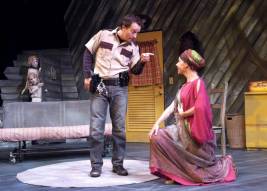 Before long, the two women are joined in the cottage by a man in sheriff’s uniform sporting a Maine accent thick enough to be cut with a knife (or ancient Greek kopis if you will), who assumes the women to be in town for the Renaissance Faire. Whoever the women are, he has come to warn them of an impending Category Five hurricane, which we hear beginning to blow outside. “Already had one accident—truck went right over the rail. Dodge Ramcharger. Wicked shame,” he tells the women. (Significant words, as we will ultimately learn.)
Before long, the two women are joined in the cottage by a man in sheriff’s uniform sporting a Maine accent thick enough to be cut with a knife (or ancient Greek kopis if you will), who assumes the women to be in town for the Renaissance Faire. Whoever the women are, he has come to warn them of an impending Category Five hurricane, which we hear beginning to blow outside. “Already had one accident—truck went right over the rail. Dodge Ramcharger. Wicked shame,” he tells the women. (Significant words, as we will ultimately learn.)
The Nursemaid in turn presumes the sheriff to be a disguised Medea, “toying with us, like a feline to its rodent prey. Her ploy is to first trick us into leaking the children’s whereabouts, upon which, she will then leak our blood.” The Woman Of Corinth begs to differ: “This man here is no villain, and to this shall you bear witness.” A catfight then ensues, which the sheriff assumes is just a “kickass show” and part of their “Rennie Faire” act.
And out in the audience you may well be asking yourself, what the heck is going on here?
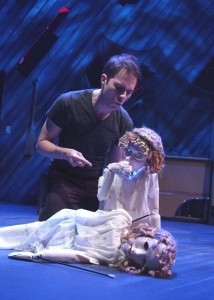 But patience, and alertness, are of the essence in The Children, both of which will be rewarded in due time as the mysteries of the past find expression in a very real present. Who are these two children, and in how many time frames do they exist? How important is it that what we are watching seems to be the very story that the brother is telling his sister in chapters? When the boy asks the sheriff, “Who are you?” and the latter responds, “Who do you need me to be?”, just what exactly does he mean? Where on earth are the two children trapped, and in what century? And what does it mean when The Man-In-Slacks and The Woman-In-Sundress begin to address themselves by names not out of Greek mythology?
But patience, and alertness, are of the essence in The Children, both of which will be rewarded in due time as the mysteries of the past find expression in a very real present. Who are these two children, and in how many time frames do they exist? How important is it that what we are watching seems to be the very story that the brother is telling his sister in chapters? When the boy asks the sheriff, “Who are you?” and the latter responds, “Who do you need me to be?”, just what exactly does he mean? Where on earth are the two children trapped, and in what century? And what does it mean when The Man-In-Slacks and The Woman-In-Sundress begin to address themselves by names not out of Greek mythology?
With so much to keep in mind, The Children may well be a play best appreciated the second time around. Still, since most will probably only have time for a single visit, the above questions are this reviewer’s attempt at guiding the way to maximum understanding at first watching without, hopefully, giving too much away.
Playwright Elyanow has not only created a cleverly constructed puzzle with clues parsed out ever so painstakingly along the way, but he has done so with a sly wit and considerable literary savvy. Amidst stilted declamations sounding straight out of Euripides (“Were I not so craven of mind and aged of body, I would have fought to stay us all put”) come self-aware quips (“Let us watch, for I sense a soliloquy nears”) and descriptions of contemporary objects as a three-thousand-year-old character might perceive them. (The Woman Of Corinth refers to a plastic shopping bag from a popular drugstore chain as a “pliable container branded with the markings of C, V, and S.”) Equally amusing is the sheriff’s quaint Mainer speech (“I know it’s a raging crapstorm out there, got a lotta people in town scared halfta hell, but come on”) and his attempts to fit in by mimicking the women’s speech patterns (“Go on, taketh … it-ith”). Taken altogether, these clever linguistic tricks keep The Children from ever becoming pretentious, humorless, or dull.
It’s of note that two of the play’s characters happen to be in same-sex relationships (I won’t tell you who), and that these are as incidental to the plot as the eye color or handedness of the actors playing them. In no way, shape, or form is The Children about being gay; two of the characters simply are, and why not?
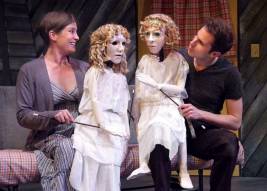 If ever there were a production where director and designers deserved equal credit alongside playwright, The Children is that play. Not only are Kubzanky’s seemingly limitless imagination and ingenuity on display throughout, but the dazzling contributions of scenic designer Francois-Pierre Couture, lighting designer Jaymi Lee Smith, sound designers Veronika Vorvel and John Zalewski, costume designer Tina Haatainen-Jones, puppet designer Susan Gratch, and properties designer Heather Ho are immeasurable in bringing Elyanow’s magical, mystical vision to life.
If ever there were a production where director and designers deserved equal credit alongside playwright, The Children is that play. Not only are Kubzanky’s seemingly limitless imagination and ingenuity on display throughout, but the dazzling contributions of scenic designer Francois-Pierre Couture, lighting designer Jaymi Lee Smith, sound designers Veronika Vorvel and John Zalewski, costume designer Tina Haatainen-Jones, puppet designer Susan Gratch, and properties designer Heather Ho are immeasurable in bringing Elyanow’s magical, mystical vision to life.
Then there are the performances, each and every one a treat, beginning the deliciously oratorical duo of Adriana Sevahn Nichols and Jacqueline Wright as The Woman Of Corinth and The Nursemaid, ancient women scene-stealingly confronting a modern world of paperback books and plastic bags. Sonny Valicenti and Paige Lindsey White deserve layers of praise for creating several characters (or are they versions of the same characters?) at different ages and in different time frames, in addition to manipulating Gratch’s Greek fresco-like Brother and Sister puppets. Finally, there is acting chameleon extraordinaire Daniel Blinkoff, once again vanishing inside a character’s unique skin (a Mainer’s this time, or at least most of the time).
Behind the scenes contributors include Emilie Beck (dramaturg), Annie Saunders (assistant director), Casey McGann (production stage manager), and Julia Flores (casting director), with key art design by Christopher Komuro.
The Children can be perplexing at times. Some may even wonder if Elyanow hasn’t asked too much of his audience and wish for a few more clues along the way. Still, by its extraordinarily moving final scene (and oh how I wish I could tell you about it), The Children is likely to have you in the palm of its hand and ever so glad to have been taken on the journey.
Theatre @ Boston Court, 70 N. Mentor Ave., Pasadena.
www.bostoncourt.org
–Steven Stanley
May 14, 2012
Photos: Ed Krieger


 Since 2007, Steven Stanley's StageSceneLA.com has spotlighted the best in Southern California theater via reviews, interviews, and its annual StageSceneLA Scenies.
Since 2007, Steven Stanley's StageSceneLA.com has spotlighted the best in Southern California theater via reviews, interviews, and its annual StageSceneLA Scenies.







 COPYRIGHT 2025 STEVEN STANLEY :: DESIGN BY
COPYRIGHT 2025 STEVEN STANLEY :: DESIGN BY